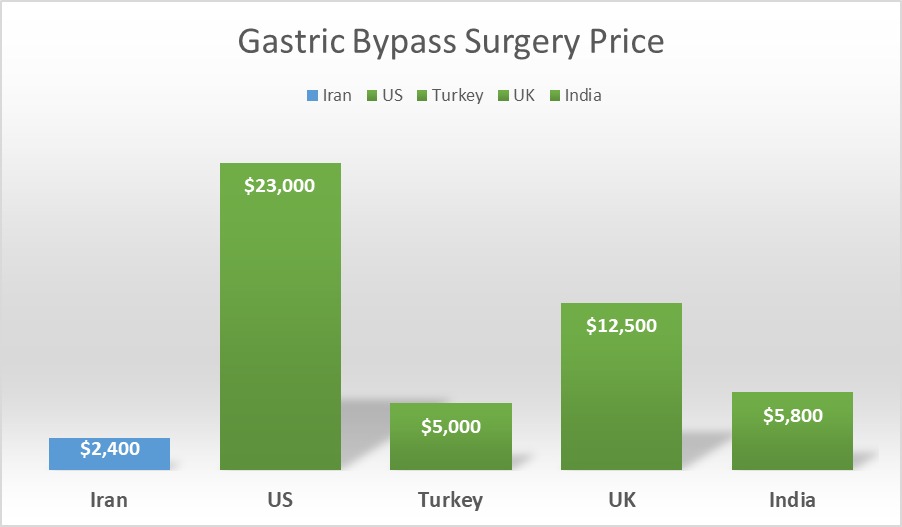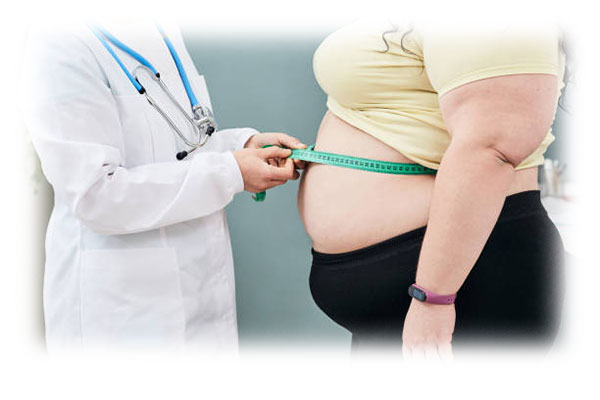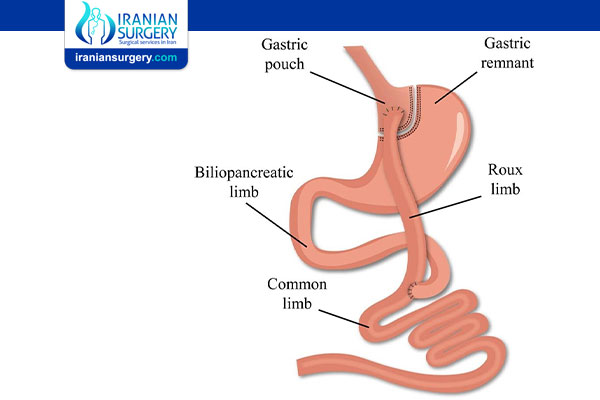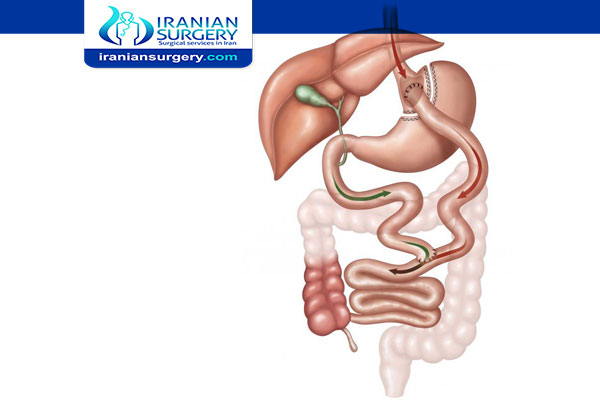How much does gastric bypass surgery cost in Iran?
Gastric Bypass surgery cost in Iran shiraz starts from $ 2400 However Cost of Gastric Bypass at Tehran city in 2022 starts from $ 3500.

Gastric bypass surgery is one of the most common weight-loss operations, which accounts for 47% of all weight-loss operations and is very popular compared to other weight-loss procedures because the possibility of complications and risks following the surgery is very low and gastric bypass surgery is generally considered to be safe. Stomach bypass surgery helps people get their body in shape and achieve physical health and relief from obesity and overweight.
Read more about : Diet after bariatric surgery
Read more about : Gastric sleeve in Iran
Gastric bypass in Iran
Although many clients think of it as a cosmetic operation, but gastric bypass surgery is first and foremost a therapeutic procedure, so it is important for the patients to benefit from the best medical staff, the best hospital and quality services. Applicants always want the best medical team and the best quality with the lowest price. The Iranian Surgery team has managed to provide that using the latest methods. It is done in the best clinics and hospitals in Shiraz and Tehran.
To reach our team of experts, simply contact us via email or WhatsApp.

General information about Gastric Bypass Surgery
The following table describes general information about Gastric Bypass Surgery in Iran including Gastric Bypass Surgery cost in Iran, recovery time, and to name but a few.
General Information |
|
Cost | $2400-3500 |
Anesthesia | General |
Hospital Stay | 2 to 3 Days |
Back to Work | 1 to 2 Weeks |
Duration of Operation | 2 to 3 Hours |
Minimum Stay in Iran | 7-10 Days |
Read more about : Bariatric surgery in Iran
Read more about : Gastric Band vs Gastric Sleeve
Read more about : Gastric Balloon Surgery In Iran
Read more about : Duodenal Switch Surgery In Iran
Before Gastric bypass Surgery
Why it's done
Gastric bypass is done to help you lose excess weight and reduce your risk of potentially life-threatening weight-related health problems, including:
. Gastroesophageal reflux disease
. Heart disease
. High blood pressure
. High cholesterol
. Obstructive sleep apnea
. Type 2 diabetes
. Stroke
. Cancer
. Infertility
Gastric bypass is typically done only after you've tried to lose weight by improving your diet and exercise habits.

Is a gastric bypass right for me?
In general, gastric bypass and other weight-loss surgeries could be an option for you if:
. Your body mass index (BMI) is 40 or higher (extreme obesity).
. Your BMI is 35 to 39.9 (obesity), and you have a serious weight-related health problem, such as type 2 diabetes, high blood pressure or severe sleep apnea. In some cases, you may qualify for certain types of weight-loss surgery if your BMI is 30 to 34 and you have serious weight-related health problems.
. You are committed to losing weight and maintaining your weight loss through lifestyle and gastric bypass diet changes.
. You have tried to lose weight in other ways such as eating healthily, exercising and taking relevant medicines.
But gastric bypass isn't for everyone who is severely overweight. You may need to meet certain medical guidelines to qualify for weight-loss surgery. You likely will have an extensive screening process to see if you qualify.
You must also be willing to make permanent changes to lead a healthier lifestyle. You may be required to participate in long-term follow-up plans that include monitoring your nutrition, your lifestyle and behavior, and your medical conditions.
What are the Advantages and Disadvantages of Gastric Bypass surgery?
Pros:
. Produces significant long-term weight loss (70 to 80 percent excess weight loss)
. Restricts the amount of food that can be consumed
. May lead to conditions that increase energy expenditure
. Produces favorable changes in gut hormones that reduce appetite and enhance satiety.
Read more about : Gastric bypass vs duodenal switch
Cons:
. Is technically a more complex operation than the AGB or LSG and potentially could result in greater complication rates.
. Can lead to long-term vitamin/mineral deficiencies particularly deficits in vitamin B12, iron, calcium, and folate.
. Generally has a longer hospital stay than the AGB
. Requires adherence to dietary recommendations, life-long vitamin/mineral supplementation, and follow-up compliance.
Risks and Complications of gastric bypass surgery
As with any major surgery, gastric bypass and other weight-loss surgeries pose potential health risks, both in the short term and long term.
Risks associated with the surgical procedure are similar to any abdominal surgery and can include:
. Excessive bleeding
. Infection (You may develop an infection in your wound or a chest infection)
. Adverse reactions to anesthesia
. Blood clots in your legs (DVT) or lungs (pulmonary embolism)
. Lung or breathing problems
. Leaks in your gastrointestinal system
Longer term risks and complications of gastric bypass can include:
. Bowel obstruction
. Dumping syndrome, causing diarrhea, nausea or vomiting
. Low blood sugar (hypoglycemia)
. Malnutrition
. Stomach perforation
. Vomiting
. Gallstones. If you lose weight quickly after your surgery, you may develop gallstones. These can be painful and you may need surgery to remove them. Your surgeon may suggest removing your gallbladder during your gastric bypass, or may prescribe medicines after your surgery, to stop this from happening.
. Hernias. If you have tummy pain after your surgery, especially after three months or so, you may have developed an internal hernia. You won’t be able to see the hernia; it won’t be visible as a lump on your skin. It happens when one of the two bowel loops that have been created during surgery twists under the other through a newly created opening. The pain may spread from your tummy to your back. If the twisted bowel gets trapped in this position, it may get blocked or the blood supply to it may be cut off. If you develop an internal hernia, you’ll need more surgery to repair it.
. You may get bleeding from a stomach ulcer. Ulcers are more common if you smoke, so you’ll be advised to stop. Your doctor may also suggest taking a type of medicine called a proton pump inhibitor to reduce the amount of acid in your stomach, and advise you to stop drinking alcohol.
. The join between your stomach pouch and small intestine can become narrower, making you feel sick and even be sick.
. You may get a leak where your intestine is re-joined to your stomach. This can be very serious and you’ll usually have an operation to repair it straightaway.
During your operation, your surgeon may find an unexpected problem and may need to switch the keyhole operation to an open procedure. This won’t affect how well the operation works, but it may take you longer to recover afterwards.
Rarely, complications of gastric bypass can be fatal.
Read more about : Gastric Band vs Gastric Sleeve
Read more about : Mini gastric bypass VS gastric bypass
Preparing for a gastric bypass operation
Your surgeon will let you know if there’s anything you need to do to prepare for your operation.
If you smoke, you’ll be asked to stop for at least eight weeks before the operation and permanently afterwards. This is because smoking makes you more likely to have complications during and after surgery.
If you can, try to lose some weight before your surgery, as this will make the operation easier and mean you’re less likely to have complications afterwards. Your surgeon may ask you to follow a low-fat, low-carbohydrate diet for one week before your operation. This helps to shrink your liver, so your surgeon is more likely to do your operation using keyhole (laparoscopic) surgery. Having keyhole surgery means you’ll have less pain after the operation and will be likely to recover more quickly.

If you’re taking any medicines (prescribed or bought from a pharmacy), it’s important to tell your surgeon before your operation. This includes non-steroidal anti-inflammatory medicines (eg ibuprofen or naproxen). Your surgeon may suggest you stop taking NSAIDs, or that you take them with medicines called proton pump inhibitors. This is because they can make you more likely to have a stomach ulcer afterwards.
Before you go to the hospital for your operation, you may want to prepare for when you return home. If you live on your own, it may be a good idea to arrange for a relative or friend to help you during the first few days after your surgery.
On the day
You’ll be admitted to hospital either the night before your gastric bypass, or on the same day. You’ll have the surgery under general anaesthesia, which means you’ll be asleep during the operation.
You’ll be asked to follow fasting instructions before your operation. This means you won’t be able to eat, typically for about six hours beforehand. You’ll be able to drink water up to two hours before, but always follow your surgeon’s advice. At the hospital, your nurse will check your heart rate and blood pressure and test your urine.
You’ll be asked to wear compression stockings on your legs. This will help prevent blood clots forming in the veins in your legs (deep vein thrombosis). You’ll also need to have an injection of an anti-clotting medicine as well as, or instead of, wearing compression stockings.
Your surgeon will discuss with you what will happen before, during and after your surgery. If you’re unsure about anything, don’t be afraid to ask. No question is too small. It’s important that you feel fully informed so you feel happy to give your consent for the operation to go ahead. You may be asked to do this by signing a consent form.
Read more about : Mini gastric bypass surgery side effects
Read more about : Mini gastric bypass surgery pros and cons
During Gastric Bypass Surgery
During the Procedure
You will be given general anesthesia before your surgery begins. Anesthesia is medicine that keeps you asleep and comfortable during surgery.
The specifics of your gastric bypass depend on your individual situation and the doctor's practices. Some surgeries are done with traditional large (open) incisions in your abdomen. However, most are performed laparoscopically, which involves inserting instruments through multiple small incisions in the abdomen.
After making the incisions with the open or laparoscopic technique, the surgeon cuts across the top of your stomach, sealing it off from the rest of your stomach. The resulting pouch is about the size of a walnut and can hold only about an ounce of food. Normally, your stomach can hold about 3 pints of food.
Then, the surgeon cuts the small intestine and sews part of it directly onto the pouch. Food then goes into this small pouch of stomach and then directly into the small intestine sewn to it. Food bypasses most of your stomach and the first section of your small intestine, and instead enters directly into the middle part of your small intestine.
The procedure can take between two and three hours, but this may vary between surgeons. After surgery, you awaken in a recovery room, where medical staff monitors you for any complications.

The gastric bypass works by several mechanisms. First, similar to most bariatric procedures, the newly created stomach pouch is considerably smaller and facilitates significantly smaller meals, which translates into less calories consumed. Additionally, because there is less digestion of food by the smaller stomach pouch, and there is a segment of small intestine that would normally absorb calories as well as nutrients that no longer has food going through it, there is probably to some degree less absorption of calories and nutrients.
Most importantly, the rerouting of the food stream produces changes in gut hormones that promote satiety, suppress hunger, and reverse one of the primary mechanisms by which obesity induces type 2 diabetes.
Why Gastric Bypass works
. Reduced stomach size makes the patient feel full sooner after eating.
. Rearranged intestines causes the body to absorb fewer minerals.
. Dumping syndrome symptoms deter patients from eating unhealthy foods.
After Gastric Bypass Surgery
What to expect afterwards
In the hospital
You’ll need to rest until the anaesthetic has worn off. You may also need pain relief.
On the first day, you may have to wear special pads attached to an intermittent compression pump on your lower legs. The pump inflates and deflates the pads and boosts the blood flow in your legs, helping to prevent deep vein thrombosis (DVT). You’ll need to wear compression stockings to help boost your circulation and continue to have injections of anti-clotting medicine.
You’ll be encouraged to get out of bed and move around as soon as you can. This helps to prevent both chest infections and blood clots developing in your legs. You may have a nasogastric tube (a tube inserted into your nose that goes down to your stomach) to keep your stomach pouch empty. This is usually taken out the following day.
You’ll have a drip put into a vein in your hand or arm to give you fluids. If you feel well enough, you can start to drink small amounts of water soon after your operation, and the drip will be removed.
Going home
You’ll usually be able to go home one to three days after your operation. You’ll need to arrange for someone to drive you home. Your nurse will tell you how to care for your healing wounds before you go home and give you a date for a follow-up appointment. You may need pain relief for a few days after the operation.
If your surgeon used dissolvable stitches, they’ll be under your skin so you won’t see them. If you have non-dissolvable stitches or clips, you’ll need to have them taken out. This is usually 7–10 days after the operation. Your surgeon will tell you when and where to have them removed.
It will probably take you between four and six weeks to recover fully from a gastric bypass operation. During this time, you’ll notice weight loss and will probably need to carry on eating soft foods. This will vary from person to person, so talk to your surgeon about what’s right for you.
Wound Care
Keeping your abdominal wound area clean and as dry as possible is important for preventing irritation and infection. While your surgeon will likely allow you to shower soon after surgery, they will advise you to pat the area dry after gently washing it with a mild soap. You will also be advised to not bathe or go into a swimming pool until the wound has fully healed (usually about three weeks).
You may have a dressing or thin bandages, called steri-strips, on your wound site(s). Talk to your doctor about how to redress the wound after showering or when you can expect the steri-strips to fall off.
You may also have surgical staples that need to be removed (around ten days after surgery) or dissolvable stitches that do not need any intervention.
Results
Gastric bypass can provide long-term weight loss. The amount of weight you lose depends on your type of surgery and your change in lifestyle habits. It may be possible to lose about 70%, or even more, of your excess weight within two years.
In addition to weight loss, gastric bypass may improve or resolve conditions often related to being overweight, including:
. Gastroesophageal reflux disease
. Heart disease
. High blood pressure
. High cholesterol
. Obstructive sleep apnea
. Type 2 diabetes
. Stroke
. Infertility
Gastric bypass can also improve your ability to perform routine daily activities, which could help improve your quality of life.

Lifestyle changes after surgery
After gastric bypass surgery, you’ll need to make major changes to your eating habits as your stomach will initially be around the size of an egg. You’ll only be able to eat small amounts at each meal – starting with liquids and purées, before moving on to solid food. Your surgeon or dietitian will give you all the information you need about which foods you can eat and how much.
It’s essential that you make the recommended changes to your diet after surgery. But this may mean you don’t get enough protein or certain vitamins and minerals, which can affect your health. If you don’t get enough iron after gastric bypass surgery, this may cause anaemia. Your surgeon is likely to recommend you take vitamin and mineral supplements, including folic acid and calcium. You may also need to have regular injections of vitamin B12. You’ll need to have regular blood tests to check you’re getting all of the vitamins, minerals and nutrients you need.
You’ll also be asked to make other changes to your lifestyle, such as being more active and keeping the amount of alcohol you drink to a minimum. These changes will help you to get the most from your gastric bypass operation, so you can lose excess weight and keep it off. Being physically active will also help to tone your muscles and improve your posture.
Losing weight after a gastric bypass is usually a positive thing. But some people find it hard to adapt to their lifestyle changes and appearance after the operation. Talk to your GP or surgeon if you’re struggling to cope, or are worried about something, as they’ll be able to suggest ways to help. Your doctor may also suggest a patient support group, where you can get support and advice from other people who have been through the operation too.
Read more about : How to tone up after gastric bypass?
When weight-loss surgery doesn't work
It's possible to not lose enough weight or to regain weight after weight-loss surgery. This weight gain can happen if you don't follow the recommended lifestyle changes. If you frequently snack on high-calorie foods, for instance, you may have inadequate weight loss. To help avoid regaining weight, you must make permanent healthy changes in your diet and get regular physical activity and exercise.
It's important to keep all of your scheduled follow-up appointments after weight-loss surgery so that your doctor can monitor your progress. If you notice that you aren't losing weight or you develop complications after your surgery, see your doctor immediately.
Gastric bypass diet: What to eat after the surgery
Diet recommendations after gastric bypass surgery vary depending on your individual situation.
A gastric bypass diet typically follows a staged approach to help you ease back into eating solid foods. How quickly you move from one step to the next depends on how fast your body heals and adjusts to the change in eating patterns. You can usually start eating regular foods about three months after surgery.
At each stage of the gastric bypass diet, you must be careful to:
. Drink 64 ounces of fluid a day, to avoid dehydration.
. Sip liquids between meals, not with meals. Wait about 30 minutes after a meal to drink anything and avoid drinking 30 minutes before a meal.
. Eat and drink slowly, to avoid dumping syndrome — which occurs when foods and liquids enter your small intestine rapidly and in larger amounts than normal, causing nausea, vomiting, dizziness, sweating and diarrhea.
. Eat lean, protein-rich foods daily.
. Choose foods and drinks that are low in fats and sugar.
. Avoid alcohol.
. Limit caffeine, which can cause dehydration.
. Take vitamin and mineral supplements daily as directed by your health provider.
. Chew foods thoroughly to a pureed consistency before swallowing, once you progress beyond liquids only.
. Liquids
For the first day or so after surgery, you'll only be allowed to drink clear liquids. Once you're handling clear liquids, you can start having other liquids, such as:
Liquids you can have during stage 1:
. Broth
. Unsweetened juice
. Decaffeinated tea or coffee
. Milk (skim or 1 percent)
. Sugar-free gelatin or popsicles
Read more about : Gastric sleeve surgery recovery time
. Pureed foods
After about a week of tolerating liquids, you can begin to eat strained and pureed (mashed up) foods. The foods should have the consistency of a smooth paste or a thick liquid, without any solid pieces of food in the mixture.
You can eat three to six small meals a day. Each meal should consist of 4 to 6 tablespoons of food. Eat slowly — about 30 minutes for each meal.
Choose foods that will puree well, such as:
. Lean ground meat, poultry or fish
. Cottage cheese
. Soft scrambled eggs
. Cooked cereal
. Soft fruits and cooked vegetables
. Strained cream soups
Blend solid foods with a liquid, such as:
. Water
. Skim milk
. Juice with no sugar added
. Broth
. Soft foods
After a few weeks of pureed foods, and with your doctor's OK, you can add soft foods to your diet. They should be small, tender and easily chewed pieces of food.
You can eat three to five small meals a day. Each meal should consist of one-third to one-half cup of food. Chew each bite until the food is pureed consistency before swallowing.
Soft foods include:
. Ground lean meat or poultry
. Flaked fish
. Eggs
. Cottage cheese
. Cooked or dried cereal
. Rice
. Canned or soft fresh fruit, without seeds or skin
. Cooked vegetables, without skin
Read more about : Bariatric surgery risks
Read more about : Bariatric surgery side effects
. Solid foods
After about eight weeks on the gastric bypass diet, you can gradually return to eating firmer foods. Start with eating three meals a day, with each meal consisting of 1 to 1-1/2 cups of food. It's important to stop eating before you feel completely full.
Depending on how you tolerate solid food, you may be able to vary the number of meals and amount of food at each meal. Talk to your dietitian about what's best for you.
Try new foods one at a time. Certain foods may cause pain, nausea or vomiting after gastric bypass surgery.
Foods that can cause problems at this stage include:
. Breads
. Carbonated drinks
. Raw vegetables
. Cooked fibrous vegetables, such as celery, broccoli, corn or cabbage
. Tough meats or meats with gristle
. Red meat
. Fried foods
. Highly seasoned or spicy foods
. Nuts and seeds
. Popcorn
Over time, you might be able to try some of these foods again, with the guidance of your doctor.
A new healthy diet
Gastric bypass surgery reduces the size of your stomach and changes the way food enters your intestines. After surgery, it's important to get adequate nourishment while keeping your weight-loss goals on track. Your doctor is likely to recommend that you:
. Eat and drink slowly. To avoid dumping syndrome, take at least 30 minutes to eat your meals and 30 to 60 minutes to drink 1 cup of liquid. Wait 30 minutes before or after each meal to drink liquids.
. Keep meals small. Eat several small meals a day. You might start with six small meals a day, then move to four meals and finally, when following a regular diet, three meals a day. Each meal should include about a half-cup to 1 cup of food.
. Drink liquids between meals. To avoid dehydration, you'll need to drink at least 8 cups (1.9 liters) of fluids a day. But drinking too much liquid at or around mealtime can leave you feeling overly full and prevent you from eating enough nutrient-rich food.
. Chew food thoroughly. The new opening that leads from your stomach into your small intestine is very narrow and can be blocked by larger pieces of food. Blockages prevent food from leaving your stomach and can cause vomiting, nausea and abdominal pain. Take small bites of food and chew them to a pureed consistency before swallowing.
. Focus on high-protein foods. Eat these foods before you eat other foods in your meal.
. Avoid foods that are high in fat and sugar. These foods travel quickly through your digestive system and cause dumping syndrome.
. Take recommended vitamin and mineral supplements. After surgery your body won't be able to absorb enough nutrients from your food. You'll likely need to take a multivitamin supplement every day for the rest of your life.
Results
The gastric bypass diet can help you recover from surgery and transition to a way of eating that is healthy and supports your weight-loss goals. Remember that if you return to unhealthy eating habits after weight-loss surgery, you may not lose all of your excess weight, or you may regain any weight that you do lose.
Risks
The greatest risks of the gastric bypass diet come from not following the diet properly. If you eat too much or eat food that you shouldn't, you could have complications. These include:
. Dumping syndrome. If too much food enters your small intestine quickly, you are likely to experience nausea, vomiting, dizziness, sweating and diarrhea. Eating too much or too fast, eating foods high in fat or sugar, and not chewing your food adequately can all cause nausea or vomiting after meals.
. Dehydration. Because you're not supposed to drink fluids with your meals, some people become dehydrated. That's why you need to sip 64 ounces (1.9 liters) of water and other fluids throughout the day.
. Constipation. A lack of physical activity and of fiber or fluid in your diet can cause constipation.
. Blocked opening of your stomach pouch. Food can become lodged at the opening of your stomach pouch, even if you carefully follow the diet. Signs and symptoms of a blocked stomach opening include ongoing nausea, vomiting and abdominal pain. Call your doctor if you have these symptoms for more than two days.
. Weight gain or failure to lose weight. If you continue to gain weight or fail to lose weight on the gastric bypass diet, talk to your doctor or dietitian.
The factors that the best Bariatric surgeons should have:
- Experience
Because of performing a great number of procedures, they become knowledgeable and highly skilled which make them very famous worldwide.
- Expertise in different types of Bariatric surgery
It is of paramount importance that your surgeon be expert in various types of Bariatric surgery.
We are happy to introduce a great number of Iranian surgeons who have all two above-mentioned features.
How can I find the best Gastric Bypass surgeon in Iran?
Bariatric surgeons in Iran, have performed numerous procedures annually which make them more experienced than other countries’. Due to high demand and low costs, thousands of people travel to Iran every year to undergo Gastric Bypass surgery.
Iranian Surgery is an online medical tourism platform that helps you to do Gastric Bypass with the best bariatric surgeons in Iran at the most affordable price.
For more information and to schedule an appointment, contact our consultants via WhatsApp number +98 901 929 0946.
This service is completely free
Read more about : Bariatric surgery requirements
Read more about : Ideal BMI for liposuction
Read more about : Ideal BMI for tummy tuck


